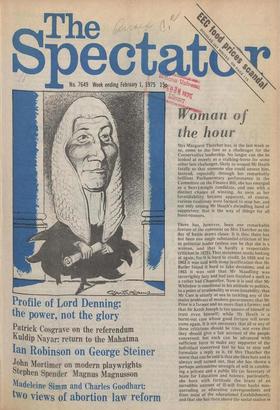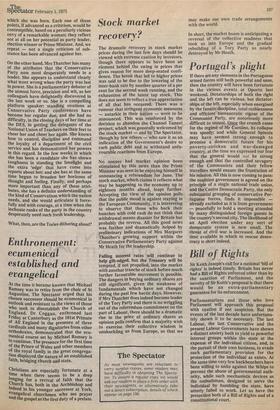oinart of the hour
Mrs Margaret Thatcher has, in the last week or so, come to the fore as a challenger for the Conservative leadership. No longer can she be looked at merely as a stalking-horse for some other late challenger, likely to wound Mr Heath fatally so that someone else could unseat him. Instead, especially through her remarkably brilliant Parliamentary performance in the Committee on the Finance Bill, she has emerged as a heavyweight candidate, and one with a distinct chance of winning. As soon as her formidability became apparent, of course, various coalitions were formed to stop her, and not only among Mr Heath's dwindling band of supporters: that is the way of things for all front-runners.
There has, however, been one remarkable feature of the comment on Mrs Thatcher as the day of battle draws closer. It is this: there has not been one single substantial criticism of her as potential leader (unless one be that she is a woman, and that is hardly a respectable criticism in 1975). That statement needs looking at again, for it is hard to credit. In 1956 and in 1963 it was said with some justification that Mr Butler found it hard to take decisions; and in 1965 it was said that Mr Maudling was incorrigibly lazy and had just finished a spell as a rather bad Chancellor. Now it is said that Mr Whitelaw is emoiional in his attitude to politics, to a point of irrationality or even instability; that Mr Carr is utterly at sea in tackling any of the major problems of modern government; that Mr Prior is a farmer and no more than a farmer; and that Sir Keith Joseph is too unsure of himself to trust even himself; while Mr Heath is a burnt-out case whose good fortune will never come again. It is not necessary that all or any of these criticisms should be true, nor even that they should give a fair account of the people concerned: but each can be advanced with sufficient force to make any supporter of the individual concerned feel he has to stop and formulate a reply to it. Of Mrs Thatcher the worst that can be said is that she likes hats and is always well turned out, that she has shown a perhaps unfeminine strength of will in combining a private and a public life (as Secretary of State for Education and Science, particularly, she bore with fortitude the brunt of an
incredible amount of from hacks masquerading as education correspondents and from most of the educational Establishment), and that she ha S risen above the social station in which she was born. Each one of those points, if advanced as a criticism, would be contemptible, based on a peculiarly vicious envy of a remarkable woman; they reflect not at all on her potential as party leader, election winner or Prime Minister. And, we repeat — not a single criticism of substance has been advanced against her.
On the other hand, Mrs Thatcher has many of the attributes that the Conservative Party now most desperately needs in a leader. She appears to understand clearly what went wrong when the party was last in power. She is a parliamentary debater of the utmost force, precision and wit, as her colleague have delightedly discovered in the last week or so. She is a compelling platform speaker: standing ovations at Conservative Party conferences have become her regular due, and she had no difficulty, in the closing days of her time at the DES, in getting the delegates of the National Union of Teachers on their feet to cheer her and cheer her again. She knows how to control, discipline and command the loyalty of a department of the civil service and has demonstrated her powers in this regard. In the few weeks in which she has been a candidate she has shown toughness in standing the limelight and the extra 'edge' that have come into reports about her; and she has at the same time begun to broaden her horizons of thought and feeling. Finally, and perhaps more important than any of these attributes, she has a definite understanding of the kind of Conservatism which the nation needs, and she would articulate it force!tiny and with courage, at a time when the inchoate ranks of the party in the country desperately need such fresh leadership.
What, then, are the Tories dithering about?



































 Previous page
Previous page